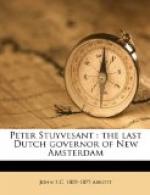Captain Manning was, in his turn, as severely censured by the people of the English colonies in America, and by the home government, as Governor Stuyvesant had been on the day of his misfortune. English pride was grievously mortified, that the commandant of an English fort should allow himself to be fired upon for hours without returning a shot.
The unfortunate captain was subsequently tried by court-martial for cowardice and treachery. He was condemned. His sword was broken over his head and he was declared incompetent forever to hold any station of trust or authority under the government. Governor Lovelace was condemned for neglect of duty. He received a severe reprimand, and all his property was confiscated to the Duke of York.
The victorious Dutch commanders appointed Captain Colve as governor of recaptured New Netherland. With great energy he commenced his rule. The name of New York was changed to New Orange, and fort James became fort Hendrick. Work was immediately commenced upon the fortifications, and large sums of money were expended upon them, so that within two months they were deemed so strong that it was thought that no English fleet would dare to venture within range of their guns. The whole city assumed the aspect of a military post. Nearly every citizen was trained to arms. The Common, now the Park, was the parade ground where the troops were daily drilled. It was very firmly resolved that the city should not again surrender without the firing of a gun.
The municipal institutions were all re-organized to conform to those of the fatherland. This second administration of the Dutch was of but short duration. On the 9th of January, 1674, but about three months after the re-capture of the city, a treaty of peace was signed between England and Holland. The sixth article of this treaty read as follows,
“Whatsoever countries, islands, ports, towns, castles or forts have been taken on both sides, since the time that the late unhappy war broke out, either in Europe or elsewhere, shall be restored to the former lord or proprietor in the same condition they shall be in when peace itself shall be proclaimed.”
Several months however transpired before the actual re-surrender of the city to the English. On the 10th of November 1674, a little more than one year after the capture of the city by the Dutch, this change took place. Mr. David V. Valentine writes:
“This event was not distasteful to the great body of the citizens, whose national sentiment had, in a measure, given way before the obvious advantages to their individual interests of having a settled authority established over them, with the additional privilege of English institutions which were then considered of a liberal tendency.”
In conclusion, we have but a few words to say respecting the manners and customs in the thriving little village of New York, in these primitive days. People




